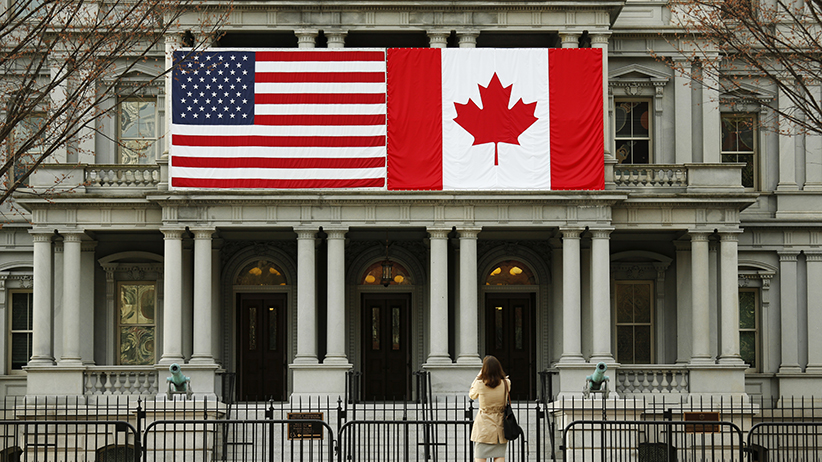On trade and NATO, the U.S. debate tone was tough
Canadians might find the personal clashes fascinating, but the policy rhetoric matters on key files
A woman stops to take a photo of the U.S. and Canadian flags placed side-by-side on the Eisenhower Executive Office Building next to the White House in Washington March 8, 2016. Preparations are under way for the official state visit of Canada’s Prime Minister Justin Trudeau on Thursday. (Kevin Lamarque/Reuters)
Share

To listen for stray moments of special interest to Canadians in the first TV debate between Hillary Clinton and Donald Trump takes a certain amount of mental discipline, some might even say a determinedly parochial ear. It’s more tempting to just declare that the whole riveting affair is of enormous interest to everybody everywhere—this is American politics, after all, and nobody anywhere can escape its implications.
Still, there were at least of couple of exchanges that mattered in a particular way to Canadians, one each on the way the way the presidential candidates regard their trade partners and their military allies. Of course, neither Clinton nor Trump broke new policy ground. Even in this highly unconventional presidential race, a televised debate would be a dangerous place to trot out truly fresh platform planks.
So, on trade, it wasn’t surprising to hear Trump taking aim, as he often has in the past, at the agreements previous presidents have negotiated. “We have to renegotiate our trade deals, and we have to stop these countries from stealing our companies and our jobs,” the Republican candidate said.
RELATED: 100 minutes, 2 debates and 1 ugly truth about America’s reputation
The prospect of a U.S. president actually trying to reopen the North American Free Trade Agreement would have to be deeply worrying to Ottawa. Since NAFTA was signed in 1994 by then prime minister Brian Mulroney, former U.S. president George H. W. Bush and Mexico’s president Carlos Salinas, it’s come to been seen as the backbone of Canada’s export economy.
Even if Trump’s threats are dismissed as bluster—perhaps too sanguine an assumption this early in a fairly close contest—they seem to have influenced Clinton’s approach already and given new impetus to anti-free-trade voices in the Democratic party. Although Clinton said cautiously in the debate that Americans should “not assume that trade is the only challenge we have in the economy,” she offered her own version of a get-tough-on-trade approach.
“I’m going to have a special prosecutor,” she vowed. “We’re going to enforce the trade deals we have, and we’re going to hold people accountable.”
It’s worth noting that more hard-nosed rhetoric from both Republicans and Democrats comes as Canada is newly reminded of nagging, perennial trade friction with the U.S. For instance, federal International Trade Minister Chrystia Freeland recently signalled that Canada-U.S. talks might fail to settle yet another iteration of the decades-old softwood lumber dispute in time to prevent Washington from imposing duties on Canadian lumber sold into the vital U.S. market.
The second subject raised in the debate that resonated for Canadian federal policy-makers was America’s relationship with its military allies. Trump took aim at NATO countries for failing to ante up enough money to justify being defended by the costly U.S. military. “The 28 countries in NATO, many of them aren’t paying their fair share,” he said. “And that bothers me.”
While he didn’t single Canada out, Ottawa’s defence planners can’t be comfortable with any closer focus among American politicians on NATO spending levels. This summer, NATO reported this week that Canada’s defence spending dropped last year to 0.98 per cent of gross domestic product—less than halfway to the two per cent target of GDP target that Canada, along with all other NATO members, agreed to aim for in 2014.
Clinton didn’t directly address Trump’s argument that America’s allies must be compelled to pay more, although she did take aim at earlier suggestions from the Republican candidate that the U.S. might not provide promised military support to countries that don’t contribute enough. “It is essential that the world knows America’s word is good.”
No moment in this debate was about Canada, except in the sense that key exchanges were about every country that relies on smooth trade relations with the U.S., or on a solid defence alliance with the world’s greatest military power. In that important sense, this debate’s rhetoric served notice that—no matter which candidate you think won the night—a more demanding mood on trade is taking hold in American politics.